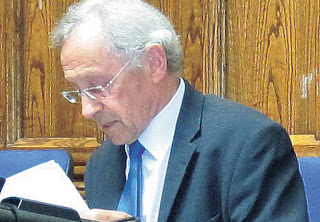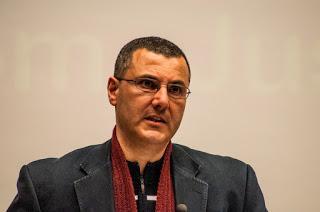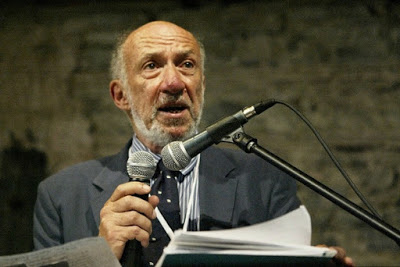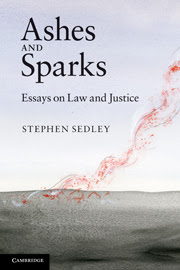The Government’s Anti-Semitism Definition is Potentially Unlawful as it
Contradicts Article 10 of the ECHR
 |
| Sir Stephen Sedley |
Article 10 of the ECHR states that:
1. Everyone has the right to freedom
of expression. This right shall include freedom to hold opinions and to receive
and impart information and ideas without interference by public authority and
regardless of frontiers. This article shall not prevent States from requiring
the licensing of broadcasting, television or cinema enterprises.
of expression. This right shall include freedom to hold opinions and to receive
and impart information and ideas without interference by public authority and
regardless of frontiers. This article shall not prevent States from requiring
the licensing of broadcasting, television or cinema enterprises.
2. The exercise of these freedoms,
since it carries with it duties and responsibilities, may be subject to such
formalities, conditions, restrictions or penalties as are prescribed by law and
are necessary in a democratic society, in the interests of national security,
territorial integrity or public safety, for the prevention of disorder or
crime, for the protection of health or morals, for the protection of the
reputation or rights of others, for preventing the disclosure of information
received in confidence, or for maintaining the authority and impartiality of
the judiciary.
since it carries with it duties and responsibilities, may be subject to such
formalities, conditions, restrictions or penalties as are prescribed by law and
are necessary in a democratic society, in the interests of national security,
territorial integrity or public safety, for the prevention of disorder or
crime, for the protection of health or morals, for the protection of the
reputation or rights of others, for preventing the disclosure of information
received in confidence, or for maintaining the authority and impartiality of
the judiciary.
 |
| Omar Barghouti – the latest victim of Israel’s attack on freedom of speech – in the UK the same type of campaign is being waged by Theresa May and New Labour’s useful idiots |
Even the misnamed Campaign Against Anti-Semitism would have
difficulty explaining how the use of the International Holocaust Remembrance
Alliance definition of anti-Semitism is compatible with the banning of Israel Apartheid
Week at one university, Central Lancashire and the restrictions place on
several others.
 |
| Professor Richard Falk – the former UN Rappoteur in Gaza who has had 2 meetings cancelled because of the IHRA definition of anti-Semitism |
The IHRA ‘definition’ of ‘anti-Semitism’, which was first
adopted by the Home Affairs Select Committee Report
on Anti-Semitism last October, is almost identical to the EUMC Working
Definition on Anti-Semitism which was removed from the web site of the EU’s Fundamental
Rights Agency in 2013. In November 2013 the Simon Wiesenthall Centre’s Shimon
Samuel’s bitterly
complained about this decision to the EU’s Foreign Minister, Catherine
Ashton
adopted by the Home Affairs Select Committee Report
on Anti-Semitism last October, is almost identical to the EUMC Working
Definition on Anti-Semitism which was removed from the web site of the EU’s Fundamental
Rights Agency in 2013. In November 2013 the Simon Wiesenthall Centre’s Shimon
Samuel’s bitterly
complained about this decision to the EU’s Foreign Minister, Catherine
Ashton
In its place the IHRA definition of anti-Semitism has been
conjured up. It has not only been warmly
conjured up. It has not only been warmly
welcomed by Theresa May, a Prime Minister who is even more reactionary than
Thatcher, but by Jeremy Corbyn. [see Manufacturing
Consent On ‘Anti-Semitism’]
Thatcher, but by Jeremy Corbyn. [see Manufacturing
Consent On ‘Anti-Semitism’]
No one should make excuses for Corbyn’s cowardice over this. Prior to becoming party leader he had spent
30 years supporting the Palestinians.
When he became leader he immediately backtraced as a result of having
himself been accused of ‘anti-Semitism’.
Instead of fighting back and saying that yes, he opposed anti-Semitism but
he also opposed the political use of anti-Semitism to attack supporters of the Palestinians
and anti-Zionists, he caved in.
30 years supporting the Palestinians.
When he became leader he immediately backtraced as a result of having
himself been accused of ‘anti-Semitism’.
Instead of fighting back and saying that yes, he opposed anti-Semitism but
he also opposed the political use of anti-Semitism to attack supporters of the Palestinians
and anti-Zionists, he caved in.
 |
| Hugh Tomlinson QC |
The result is that Labour is now further to the right on Palestine
than it was under Tony Blair and Corbyn is reduced to nodding his head when
Theresa May mentions the word ‘anti-Semitism’.
than it was under Tony Blair and Corbyn is reduced to nodding his head when
Theresa May mentions the word ‘anti-Semitism’.
On the 8th March a legal
opinion was obtained from HUGH TOMLINSON QC that the IHRA definition of anti-Semitism
and the way it is being applied is potentially unlawful and flies in the face
of Article 10(2) of the European Convention on Human Rights. In paragraph 21 of the Opinion, Tomlinson
states that:
opinion was obtained from HUGH TOMLINSON QC that the IHRA definition of anti-Semitism
and the way it is being applied is potentially unlawful and flies in the face
of Article 10(2) of the European Convention on Human Rights. In paragraph 21 of the Opinion, Tomlinson
states that:
In my view any public
authority which sought to apply the IHRA Definition to decisions concerning the
prohibition or sanctioning of activity which was critical of the State or
Government of Israel would be acting unlawfully if it did not require such
activity also to manifest or incite hatred or intolerance towards Jews. If an
authority applied the IHRA Definition without such a requirement it would be in
breach of Article 10 of the Convention and would, therefore, be acting
unlawfully under domestic law in the United Kingdom.
authority which sought to apply the IHRA Definition to decisions concerning the
prohibition or sanctioning of activity which was critical of the State or
Government of Israel would be acting unlawfully if it did not require such
activity also to manifest or incite hatred or intolerance towards Jews. If an
authority applied the IHRA Definition without such a requirement it would be in
breach of Article 10 of the Convention and would, therefore, be acting
unlawfully under domestic law in the United Kingdom.
On 27th March the group Free Speech on Israel held a press conference in
the House of Lords at which the former Court of Appeal Judge, Sir Stephen
Sedley, spoke. Sedley is not a household
name but he was the best friend that the labour movement and civil libertarians
ever had on the benches of that august and conservative body, the Court of
Appeal. A number of his more liberal
judgements, especially his ruling that the fiction that agency workers were not
employees was not credible, were reversed by the House of Lords. [see Dacas v Brook Street
Bureau]
the House of Lords at which the former Court of Appeal Judge, Sir Stephen
Sedley, spoke. Sedley is not a household
name but he was the best friend that the labour movement and civil libertarians
ever had on the benches of that august and conservative body, the Court of
Appeal. A number of his more liberal
judgements, especially his ruling that the fiction that agency workers were not
employees was not credible, were reversed by the House of Lords. [see Dacas v Brook Street
Bureau]
Sedley gave a very coherent and cogent analysis of why the
IHRA definition of anti-Semitism has been used, not to tackle anti-Semitism but
as a means to clamp down on free speech on Israeli.
IHRA definition of anti-Semitism has been used, not to tackle anti-Semitism but
as a means to clamp down on free speech on Israeli.
“The purpose of
this meeting is to draw attention to a growing concern about the misuse for
political purposes of the concept of anti-semitism. The misuse in question is
the conflation of criticism of Israel with hostility to Jews. Its political
purpose is to prohibit or inhibit discourse or action inimical to the state of
Israel.
this meeting is to draw attention to a growing concern about the misuse for
political purposes of the concept of anti-semitism. The misuse in question is
the conflation of criticism of Israel with hostility to Jews. Its political
purpose is to prohibit or inhibit discourse or action inimical to the state of
Israel.
There are two
distinct backstories to the catch-all meaning of antisemitism with which this
meeting is immediately concerned.
distinct backstories to the catch-all meaning of antisemitism with which this
meeting is immediately concerned.
One is the
longstanding, and largely successful, endeavour to segregate anti-semitism from
racism. It has for a good many years been part of Zionist discourse to contend
that racism is one thing – based on concepts of genetic inferiority – and
anti-semitism another, based on historical and theological as well as genetic
factors. This is not the place to pursue the argument, save perhaps to note that
anti-semites do not as a rule worry about whether their targets are observant,
orthodox or secular Jews: their spleen is directed at members of a race.
longstanding, and largely successful, endeavour to segregate anti-semitism from
racism. It has for a good many years been part of Zionist discourse to contend
that racism is one thing – based on concepts of genetic inferiority – and
anti-semitism another, based on historical and theological as well as genetic
factors. This is not the place to pursue the argument, save perhaps to note that
anti-semites do not as a rule worry about whether their targets are observant,
orthodox or secular Jews: their spleen is directed at members of a race.
The other
backstory is the Zionist claim to represent all the world’s Jews – a claim
welcomed by Islamic extremists. Nothing suits Islamic fundamentalism better
than the idea that all Jews are equally implicated in the excesses of Zionism.
The claim depoliticises Zionism and legitimises jihadist anti-semitism.[1]
backstory is the Zionist claim to represent all the world’s Jews – a claim
welcomed by Islamic extremists. Nothing suits Islamic fundamentalism better
than the idea that all Jews are equally implicated in the excesses of Zionism.
The claim depoliticises Zionism and legitimises jihadist anti-semitism.[1]
Against this
already dangerous backdrop, we are now looking at the no doubt well-intentioned
but naïve adoption by our executive government of a protean definition of
anti-semitism which is open to manipulation and capture by the background interests
I have mentioned. In this regard I would go rather further than Hugh Tomlinson
does in his careful and
well-reasoned Opinion. The governing proposition that antisemitism is “a
certain perception of Jews, which may be expressed as hatred towards
Jews” carries the clear implication that it may equally be expressed in other,
unspecified, ways.
already dangerous backdrop, we are now looking at the no doubt well-intentioned
but naïve adoption by our executive government of a protean definition of
anti-semitism which is open to manipulation and capture by the background interests
I have mentioned. In this regard I would go rather further than Hugh Tomlinson
does in his careful and
well-reasoned Opinion. The governing proposition that antisemitism is “a
certain perception of Jews, which may be expressed as hatred towards
Jews” carries the clear implication that it may equally be expressed in other,
unspecified, ways.
As Hugh
Tomlinson says, this passage is vague and confusing; but I am not sure that the
critique should stop there. It seems to me that its open-ended formulation has
a thought-out purpose: to bring within the pale of antisemitism perceptions of
Jews – possibly but not necessarily of all Jews – which fall short of hatred.
While this may legitimately cover familiar antisemitic slanders about greed,
clannishness and so forth, it is also capable of embracing perceptions of
Zionism which are the subject of legitimate debate and disagreement.
Tomlinson says, this passage is vague and confusing; but I am not sure that the
critique should stop there. It seems to me that its open-ended formulation has
a thought-out purpose: to bring within the pale of antisemitism perceptions of
Jews – possibly but not necessarily of all Jews – which fall short of hatred.
While this may legitimately cover familiar antisemitic slanders about greed,
clannishness and so forth, it is also capable of embracing perceptions of
Zionism which are the subject of legitimate debate and disagreement.
That this is
part of the intended reach is now becoming evident. One of the adopted examples
is “Denying the Jewish people their right to self-determination, e.g. by
claiming that the existence of the State of Israel is a racist endeavour.” This
passage bristles with controversial assumptions. Is there a single entity capable
of being characterised as “the Jewish people”? Am I obliged to regard
myself as bound by ethnicity to people like Benjamin Netanyahu? Then, assuming
that there is such an ethnic entity, from where does it derive a collective
right to self-determination capable of defeating the right to
self-determination of other peoples, above all the Palestinian people? There
have been many Jews – my father was one – who long before 1947 opposed the
Zionist project on the ground that Jewish exceptionalism was exactly what
antisemitism needed.
part of the intended reach is now becoming evident. One of the adopted examples
is “Denying the Jewish people their right to self-determination, e.g. by
claiming that the existence of the State of Israel is a racist endeavour.” This
passage bristles with controversial assumptions. Is there a single entity capable
of being characterised as “the Jewish people”? Am I obliged to regard
myself as bound by ethnicity to people like Benjamin Netanyahu? Then, assuming
that there is such an ethnic entity, from where does it derive a collective
right to self-determination capable of defeating the right to
self-determination of other peoples, above all the Palestinian people? There
have been many Jews – my father was one – who long before 1947 opposed the
Zionist project on the ground that Jewish exceptionalism was exactly what
antisemitism needed.
Lastly,
accepting as one must that the state of Israel, whatever has been argued in the
past about its right to exist, is a geopolitical ‘fact on the ground’, why are
people, including many Jews, not entitled, without being branded anti-Semitic,
to regard it in its present form as both a colonialist and an apartheid state?
The demand that criticism, to be legitimate, must be ‘similar to that
levelled against any other country’ assumes that there are other countries
which behave like Israel. There may well be, but how can this properly be a
precondition of any criticism?
accepting as one must that the state of Israel, whatever has been argued in the
past about its right to exist, is a geopolitical ‘fact on the ground’, why are
people, including many Jews, not entitled, without being branded anti-Semitic,
to regard it in its present form as both a colonialist and an apartheid state?
The demand that criticism, to be legitimate, must be ‘similar to that
levelled against any other country’ assumes that there are other countries
which behave like Israel. There may well be, but how can this properly be a
precondition of any criticism?
I will not
travel over the consequential legal ground that Hugh Tomlinson so ably
traverses. It is sufficient to emphasise these points:
travel over the consequential legal ground that Hugh Tomlinson so ably
traverses. It is sufficient to emphasise these points:
1.
The
adoption by government of the IHRA’s “working definition” does not clothe it
with any legal force. At the same time, it is not neutral: it may well
influence policy both domestically and internationally.
The
adoption by government of the IHRA’s “working definition” does not clothe it
with any legal force. At the same time, it is not neutral: it may well
influence policy both domestically and internationally.
2.
No
policy, however, can be adopted or used in defiance of the law. The Convention
right of free expression, now part of our domestic law by virtue of the Human
Rights Act, places both negative and positive obligations on the state which
may be put at risk if the IHRA definition is unthinkingly followed. And s. 43
of the 1986 Education Act, while passed to deal with very different kinds of
controversy, vouchsafes an individual right of free expression in all higher
education institutions which cannot be cut back by governmental policies.
No
policy, however, can be adopted or used in defiance of the law. The Convention
right of free expression, now part of our domestic law by virtue of the Human
Rights Act, places both negative and positive obligations on the state which
may be put at risk if the IHRA definition is unthinkingly followed. And s. 43
of the 1986 Education Act, while passed to deal with very different kinds of
controversy, vouchsafes an individual right of free expression in all higher
education institutions which cannot be cut back by governmental policies.
What is needed
now is a principled retreat on the part of government from a stance which it
has naively adopted in disregard of the sane advice given to it by the Home
Affairs Select Committee.”
now is a principled retreat on the part of government from a stance which it
has naively adopted in disregard of the sane advice given to it by the Home
Affairs Select Committee.”
[1]
For my part I am critical of the ECtHR’s judgment in CICAD v
Switzerland, because it failed to recognise that the offending article,
with its assertion that “when Israel is exposed … it is Judaism that is exposed
at the same time” was a classic attempt to taint all Jews with Israel’s
violations of human rights. Its author in my view had been rightly accused of
antisemitism.
For my part I am critical of the ECtHR’s judgment in CICAD v
Switzerland, because it failed to recognise that the offending article,
with its assertion that “when Israel is exposed … it is Judaism that is exposed
at the same time” was a classic attempt to taint all Jews with Israel’s
violations of human rights. Its author in my view had been rightly accused of
antisemitism.
Posted in Blog
